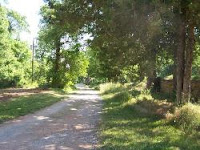 |
| Canehill, Arkansas |
Cane Hill, now condensed to Canehill, was actually a series of small but important communities in the southwest corner of Washington County. Not only was it important for economic and agricultural reasons, Cane Hill was the point where key roads intersected after crossing over the rugged Boston Mountains from Van Buren, Fort Smith and the Arkansas River valley to the south. From there, a series of roads spread out to Fayetteville and other important locations across Northwest Arkansas.
 |
| Confederate Position at Canehill |
In anticipation of this, Hindman sent General John S. Marmaduke and his three small brigades of Confederate cavalry to occupy Cane Hill. After brief skirmishing on the 25th, this was achieved and by the evening of the 26th, Marmaduke was in position at Cane Hill. The movement set off a series of events that would lead to the bloody Battle of Prairie Grove on December 7, 1862.
News of Marmaduke's presence at Cane Hill did not take long to reach Union General James G. Blunt, who was camped a day's march to the north with his brigade of the Federal Arm of the Frontier. Blunt immediately ordered his men to get ready to move.
I'll continue to post on the November 1862 events at Cane Hill tomorrow. Until then, you can read more at www.exploresouthernhistory.com/ARCaneHill.
No comments:
Post a Comment